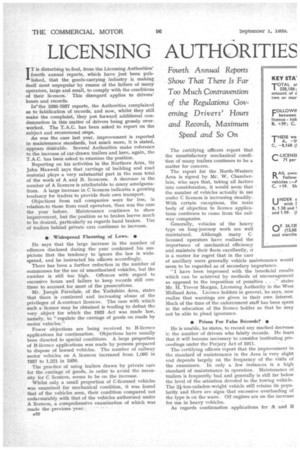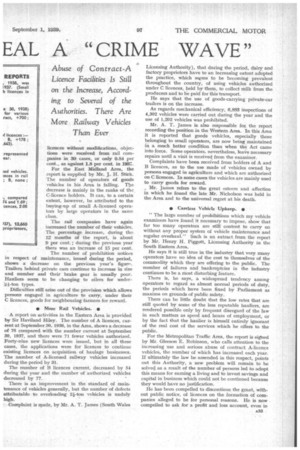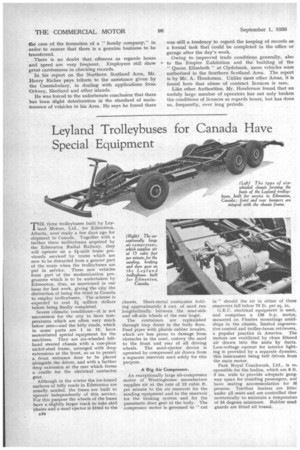LICENSING AUTHoRITIES EAL A "CRIME WAVE"
Page 34

Page 35

Page 36

If you've noticed an error in this article please click here to report it so we can fix it.
IT is disturbing to find, from the Licensing Authorities' fourth annual reports, which have just been published, that the goods-carrying industry is making itself most unpopular by reason of the failure of many operators, large and small, to comply with the conditions of their licences. This disregard applies to drivers' hours and records.
In`the 1930-1937 reports, the Authorities complained as to falsification of records, and now, whilst they still make the complaint, they put forward additional condemnation in this matter of drivers being grossly overworked. The T.A.C. has been asked to report on the subject and recommend steps.
As was the case last year, improvement is reported in maintenance standards, but much more, it is stated, appears desirable. Several Authorities make reference to the increase of car-drawn trailers and here, again, the T.A.C. has been asked to examine the position.
Reporting on his activities in the Northern Area, Sir John Maxwell says that carriage of building and road material plays a very substantial part in the sum total of the work of A and B. licencees. A decrease in the number of A licences is attributable to many amalgamations. A large increase in C licences indicates a growing tendency for traders to provide their own transport.
Objections from rail companies were far less, in relation.to those from road operators, than was the case the year before. Maintenance continues to show improvement, but the position as to brakes leaves much to be desired, particularly as regards hand brakes. Use of trailers behind private cars continues to increase.
• Widespread Flaunting of Laws. • He says that the large increase in the number of offences disclosed during the year confirmed his suspicions that the tendency to ignore the law is widespread, and he instructed his officers accordingly. There has been a further reduction in the number of summonses for the use of unauthorized vehicles, but the number is still too high. Offences with regard to excessive hours and failure to keep records still continue to account for most of the prosecutions.
Mr. Joseph Farndale, of the Yorkshire Area, states that there is continued and increasing abuse of the privileges of A-contract licences. The ease with which such a licence may be obtained is tending to defeat the very object for which the 1933 Act was made law, namely, to "regulate the carriage of goods on roads by motor vehicles."
Fewer objections are being received to B-licence applications for continuation. Objections have usually been directed to special conditions. A large proportion of B-licence applications was made by persons prepared to dispose of horsed vehicles. The number of railway motor vehicles on A licences increased from 1,095 in 1937 to 1,221 in 1938.
The practice of using trailers drawn by private cars for the carriage of goods, in order to avoid the necessity for C licences, seems to be on the increase.
Whilst only a small proportion of C-licensed vehicles was examined for mechanical condition, it was found that of the vehicles seen, their condition compared not unfavourably with that of the vehicles authorized under A licences, a comprehensive examination of which was made the previous year. — 02
The certifying officers report that the unsatisfactory mechanical condition of many trailers continues to be a matter for concern.
The report for the North-Western Area is signed by Mr. W. Chamberlain. who says that, taking all factors into consideration, it would seem that the number of vehicles actually in use under C licences is increasing steadily. With certain exceptions, the main body of objection to licence applications continues to come from the railway companies.
Generally, vehicles of the heavy type on long-journey work are well maintained. Although many C. licensed operators have realized the importance of mechanical efficiency and maintain their fleets excellently, it is a matter for regret that in the case of ancillary users generally vehicle maintenance would seem to be regarded as of secondary importance.
"I have been impressed with the beneficial results which can be achieved by methods of encouragement as opposed to the imposition of penalties . • ." states Mr. H. Trevor Morgan, Licensing Authority in the West Midland Area. Licence holders in general, he says, now realize that warnings are given in their own interest. Much of the time of the enforcement staff has been spent in the education of the licence holder so that he may not be able to plead ignorance.
OF 34,12( (13,68 coal mercha
• Prison For False Records? •
He is unable, he states, to record any marked decrease in the number of drivers who falsify records. He fears that it will become necessary to consider instituting proceedings under the Perjury Act of 1911.
The certifying officers report that the improvement in the standard of maintenance in the Area is very slight and depends largely on the frequency of the visits of the examiners. In only a few instances is a high standard of maintenance in operation. Maintenance of trailers is frequently bad and generally is still far below the level of the attention devoted to the towing vehicle. The 2i-ton-unladen-weight vehicle still retains its popularity and there are signs that excessive overloading of the type is on the wane. Oil engines are on the increase for use in heavy vehicles.
As regards continuation applications for A and B licences without modifications, objections were received from rail companies in 30 cases, or only 0,84 per cent., as against 1.8. per cent, in 193: For the East Midland Area, the report is supplied by Mr. j. H. Stirk_ The number of operators of goods vehicles in his Area is falling. Tbe decrease is mainly in the ranks of the C-Iicence holders. It can, to a certain extent, however, be attributed to the buying-up of small A-licensed operators by large operators in the same class.
The rail companies have again increased the number of their vehicles. The percentage increase, during the 12 months of the report, is about 9 per cent. ; during the previous year there was an increase of 15 per cent.
The number of prohibition notices in respect of maintenance, issued during the period, shows a decrease on the previous year's. figure. Trailers behind private cars continue to increase in size and number and their brake gear is usually poor. Hauliers seem to be changing to oilers for under21-ton types.
Difficulties still arise out of the provision which allows persons engaged in agriculture to carry, under their C licences, goods for neighbouring farmers for reward.
• More Rail Vehicles. •
A report on activities in the Eastern Area is provided by Sir Haviland Hiley. The number of A licences, current at September 30, 1938, in the Area, shows a decrease of 75 compared with the number current at September 30, 1937, and there were 71 fewer vehicles authorized. Forty-nine new licences were issued, but in all these cases, the applications were for licences to continue existing licences on acquisition of haulage businesses. The number of A-licensed railway vehicles increased during the.period by 31.
The number of B licences current, decreased by 54 during the year and the number of authorized vehicles decreased by 77.
There is an improvement in the standard of maintenance of vehicles generally, but the number of defects attributable to overloading 2i-ton vehicles is unduly high.
Complaint is made, by Mr. A. T. James (South Wales Licensing Authority), that during the period, dairy and factory proprietors have to an increasing extent adopted the practice, which stvms to be becoming prevalent throughout the country, of using vehicles authorized under C licences, held by them, to collect milk from the producers and to Le paid for this transport.
He says that the use of goods-carrying private-car trailers is on the increase.
As regards mechanical efficiency, 3,883 inspections of 4,302 vehicles were carried out during the year and the use of 1,202 vehicles was prohibited.
Mr. A. T. James is also responsible for the report recording the position in the Western Area. In this Area it is reported that goods vehicles, especially those belonging to small operators, are now being maintained in a much better condition than when the Act came into force. Some operators, nevertheless, leave necessary repairs until a visit is received from the examiner.
Complaints have been received from holders of A and B licences, as to the use made of vehicles owned by persons engaged in agriculture and which are authorized on C licences. In some cases the vehicles are mainly used to carry goods for reward.
Mr. James refers to the great esteem and affection in which he found the late Mr. Nicholson was held in the Area and to the universal regret at his death.
• Careless Vehicle Upkeep. • The large number of prohibitions which my vehicle examiners have found it necessary to impose, show that far too many operators are still content to carry on without any proper system of vehicle maintenance and regular overhaul." Such is an extract from the report by Mr. Henry H. Piggott, Licensing Authority in the South Eastern Area.
He says it is still true in the industry that very many operators have no idea of the cost to themselves of the commodity which they are offering to the public. The number of failures and bankruptcies in the industry continues to be a most disturbing feature.
There is, he says, a widespread tendency among operators to regard as almost normal periods of duty, the periods which have been fixed by Parliament as maxima on grounds of public safety.
There can be little doubt that the low rates that are still quoted by some of the less reputable hauliers, are rendered possible only by frequent disregard of the law in such matters as speed and hours of employment, or by the fact that the haulier is himself entirely ignorant of the real cost of the services which he offers to the public.
For the Metropolitan Traffic Area, the report is sighed by Mr. GIeeson E. Robinson, who calls attention to the increasing use and serious abuse of contract A-licence vehicles, the number of which has increased each year. If ultimately the law be amended in this respect, points out this Authority, a new problem will remain to be solved as a result of the number of persons led to adopt this means for earning a living and to invest savings and capital in business which could not be continued because they would have no justification.
He has been compelled to discontinue the grant, without public notice, of licences on the formation of companies alleged to be for personal reasons. He is now compelled to ask for a profit and loss account, even in
the case of the formation of a " family company," in order to ensure that there is a genuine business to be transferred.
There is no doubt that offences as regards hours and speed are very frequent. Employers still show great carelessness in checking records.
In his report on the Northern Scotland Area, Mr. Henry Riches pays tribute to the assistance given by the Constabulary, in dealing with applications from Orkney, Shetland and other islands.
He was forced to the unfortunate conclusion that there has been slight deterioration in the standard of maintenance of vehicles in his Area. He says he found there was still a tendency to regard the keeping of records as a formal task that could be completed in the office or garage after the day's work.
Owing to improved trade conditions generally, also to the Empire Exhibition and the building of the "Queen Elizabeth" at Clydebank, more vehicles were authorized in the Southern Scotland Area. The report is by Mr. A. Henderson. Unlike most other Areas, it is found here that abuse of contract licences is rare. Like other Authorities, Mr. Henderson found that an unduly large number of operators has not only broken the conditions of licences as regards hours, but has done so, frequently, over long periods.




































































